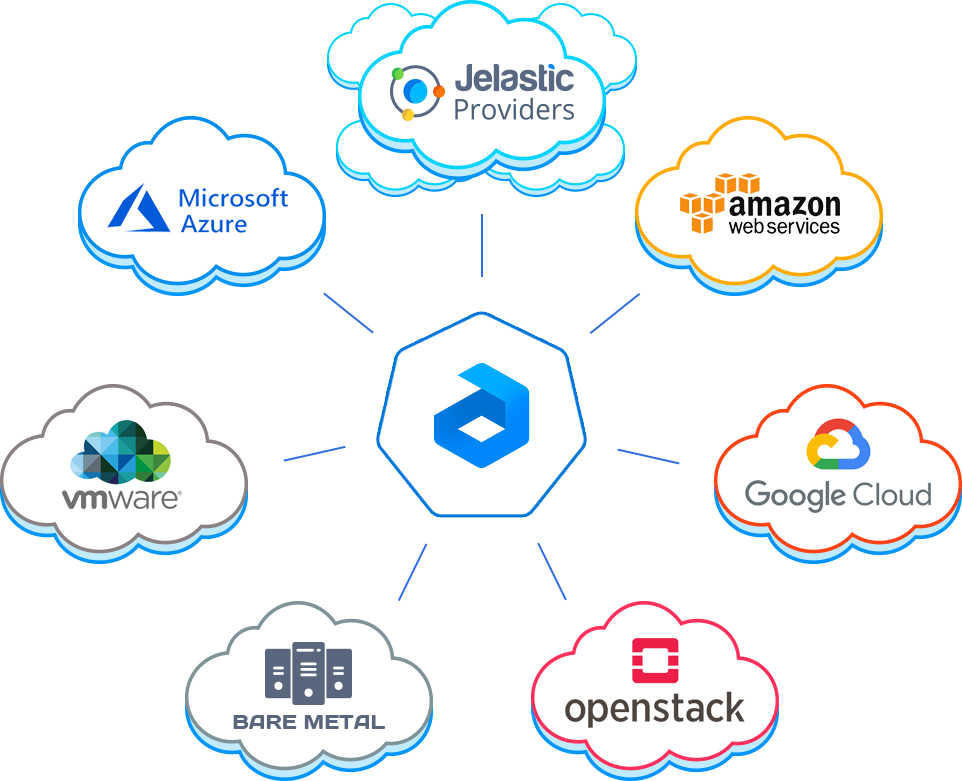GUEST BLOG: Ruslan Synytsky
Multi-cloud is defined as an approach that combines more than one cloud (public or private), from more than a single cloud vendor. However, this is not an aggregation of various services from different vendors, it requires a mandatory glue - cloud-agnostic approach with interoperability across all providers. Below we’ll cover what challenges can be faced while multi-cloud implementation, and how to achieve the required interoperability.

Expertise Gap while Migrating to Multi-Cloud
Extending the number of cloud environments usually leads to extending the skills, tools, and efforts required to run these environments effectively. So before starting the movement, an organization should be ready to make investments in order to get the needed skill sets internally, or partner with a managed service provider that has a proven track record of multi-cloud expertise.
The right multi-cloud management tool can ease and automate the deployment of existing standards and policies across new cloud networks. But such cloud platform should also be chosen by taking into consideration upcoming company’s plans to eliminate the problem of vendor lock-in in the future.
Management Complexity
Running several clouds requires not only skills but human and time resources. Even seemingly simple things as resource provisioning can be tangled if vendors use various methods or measures.
DevOps experts who can work across multiple cloud platforms are difficult to find. So a possible solution here can be to choose the right platform that provides automation and unified management of public and private clouds within a single panel.
Companies should omit cases that lead to significant reconfiguration or cloud-specific adaptation of applications, as well as a mismatch of features. If the application requires different cloud-specific APIs or services on various clouds, their deployment or migration across platforms needs immense work each time, then it loses the multi-cloud meaning and leads to a waste of efficiency. In order to avoid unnecessary complexity, it is important to follow standardization in tools and processes, as well as avoid using any proprietary services that are not available at other cloud providers.
Security Concerns
Multiple cloud platforms open a wider choice of possible attacks and vulnerabilities and thus require extra efforts to gain effective security, governance, and compliance.
Nowadays, cloud vendors implement modern approaches to digital assets protection. But despite this fact, the main responsibility remains on the company itself when it comes to multi-cloud strategy. It’s vital to thoroughly discuss security requirements, how to avoid failures in protection, as well as what reaction to the security breach or data loss should be.
Cost Tracking
Cloud diversity can lead to extra risks and loss of control over the budgeting. Oversight, lack of ROI analysis and tracking of cloud consumption can grow into a big waste.
In order to ensure multi-cloud efficiency, the organization has to continuously monitor the cloud spends, tune them in accordance with the projects and work of the team, as well as be proactive predicting the future consumption patterns.
In some cases, taming multi-cloud economics can be considered as the biggest challenge. Every platform has its own billing system, pricing model, resizing and payment options, so optimization and consolidation of the whole budgeting can become a total nightmare. That’s why this requires either internal team (e.g. cloud cost analyst, engineers for tuning) or partnership with a managed multi-cloud provider that can consolidate the data and provide cost analysis.
Redundancy Strategy
Building the strategy for application and data redundancy, backups, disaster recovery, and failover protection cannot be overrated.
The system should include the possibility for automatic switching to the backup platform in case of failed operability or full non-availability of the primary cloud. And to avoid data loss during the transfer, it is required to think through the process of data synchronization between every instance or application replica across multi-cloud implementation, as well as perform database updates between clouds with the lowest latency possible.
Here comes in handy backup and disaster recovery solutions from vendors like Acronis, as they are already built specifically for covering such needs. So there is no necessity to waste time and resources on creating own tools for data protection from scratch.
Compliance with Data Regulations
While choosing vendors for your multi-cloud infrastructure, it is important to consider the policies and regulations of your company, country where you plan to locate workloads, and the provider itself.
Some local governments restrict data storing, so you cannot place it outside the country. Also, different organizations like financial or governmental institutions can host their sensitive workloads only in highly secure private clouds. All such specifics should be considered before involving the vendor in your multi-cloud strategy.
Summary
The key ingredient of a solid multi-cloud strategy is the abstraction. Organizations need a governance layer which can provide this complete abstraction from the unique functionality of different cloud vendors and enable cloud-agnostic implementation without extra complexity. Such converging point between the company and clouds should be either aware of all cloud specifics, or combine standardized services from the required clouds and provide missing functionality based on the company needs. Multi-cloud management platforms like Jelastic provide the required level of interoperability to ease the entry point and eliminate complicated processes throughout the project lifecycle.
# # #

Ruslan Synytsky is CEO and co-founder of Jelastic PaaS, a company that delivers turnkey business multi-cloud platform for MSPs, Telcos and hosting providers. He is an expert in large-scale distributed applications and enterprise platforms, and he designed the core technology of the Platform-as-a-Service that runs millions of containers across a decentralized network of independent data center providers worldwide.
About Acronis
A Swiss company founded in Singapore in 2003, Acronis has 15 offices worldwide and employees in 50+ countries. Acronis Cyber Protect Cloud is available in 26 languages in 150 countries and is used by over 21,000 service providers to protect over 750,000 businesses.


